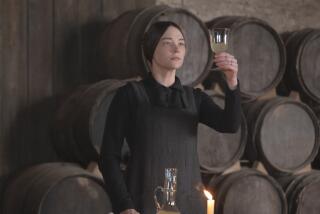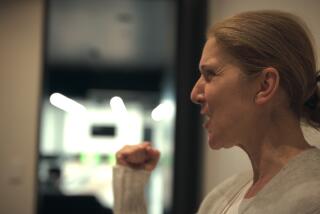BOOK REVIEW : A Heroine Deserving of a Real Biography
- Share via
If subjects could choose their biographers, would Camille Claudel have selected Anne Delbee? What would she have made of “Une Femme,” a fanciful, extravagant, florid, fictional account of her life?
Claudel was a rebel from earliest childhood, intense, committed, a formidable presence even when we first encounter her as a 13-year-old at the family home in the provincial town of Villeneuve.
Her brother, poet and diplomat Paul Claudel, described her as “a proud girl in her triumphant burst of beauty and genius, dominating, often cruel” but with “an impressive manner full of courage, frankness, genius, gaiety. A woman who had great gifts.”
Reading those words in the course of her research on Paul Claudel, Delbee postponed that project to turn her attention to Camille, who had defied 19th-Century convention to become a sculptor, an unthinkable choice for a girl of that era.
At first a student of Rodin, Camille became his assistant, his colleague and his lover in rapid succession. The passionate affair lasted for 15 tumultuous years, ending only with Rodin’s death in 1913. Within a week, Camille, grieving and impoverished, was carted off to a mental hospital at the behest of the bourgeois family that had never understood her passionate commitment to her art and left there until her death in 1943 at the age of 79.
Virtually nothing was heard of Camille Claudel for 40 years, until the appearance of a biography by her grand-niece, Reine-Marie Paris, and, in quick succession, a drama and this biographical novel by Delbee, works that evolved into the 1989 film “Camille Claudel,” in which Isabelle Adjani plays Camille and Gerard Depardieu, Rodin.
Although films adapted from books often tend to take liberties with the original material, in this case the movie seems direct and linear in comparison with this flamboyantly fictionalized biography. Delbee is a highly impressionistic writer, creating a collage of fact, dream, fiction and pure fantasy that often seems at odds with her subject.
In the few realistic glimpses we have of Claudel (the terse excerpts from her actual letters from the asylum) she seems not only lucid and controlled but utterly pragmatic.
As an artist, she was a premature hyper-realist, her work controversial because she categorically refused to temper her vision with sentimentality or even the gentility expected of a woman of her time.
What would the real Claudel, so audacious and uncompromising, have thought of the graphic recreations of her sexual relations with Rodin, (“The alpha and omega, a whole world suspended in a second, a world--a second--stopped in its course. . . . What was that secret playing between their two steaming mouths?”), about the bathos in which Delbee envelopes her entire life?
Rodin, burdened with the aging, ailing woman who was the mother of his renegade son, could never bring himself to abandon his loyal Rose to marry the vibrant young sculptor he loved.
Although Rodin rented houses in which he and Camille could work and live, he seldom spent a night with her, leaving whenever Rose summoned him.
Finally, when Camille realized that the relationship with Rodin would never be more than mentor and acolyte, lover and mistress, she tried to end the connection.
Still young and compellingly beautiful, she attracted other celebrated admirers, but none could take the place of the man who had formed and shaped her life since she was 18.
By the time she was in her early 30s, she had become a virtual recluse, existing only for sporadic visits from her beloved brother and for even more occasional encounters with Rodin, the man who had been her entire world. Genuinely tragic, the story of Camille Claudel is a feminist nightmare.
Although she earned every iota of her belated recognition, Claudel might have preferred that she have a genuine biographer who celebrated her remarkable life with the dignity and restraint that governed it, emphasizing the prodigious talent and the resilient spirit with which she confronted adversity, treating her as a heroine instead of as a victim.
CAMILLE CLAUDEL Une Femme by Anne Delbee Translated by Carol Cosman Mercury House $20; 353 pages


